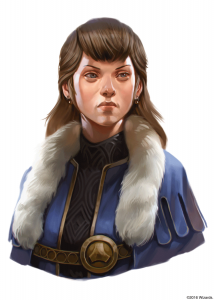Another Dungeons & Dragons post! What can I say? I’ve got the game on the brain.
One of my favorite parts of Dungeons & Dragons is coming up with the backstory of my character. Why would someone choose a life of danger and adventure in the world?
There’s a running joke that every character in a tabletop game has a tragic backstory and dead parents, but that doesn’t have to be the case. Looking to make your own character? Here are a few tips to help your creation shine and really make the most of the game.

Duvessa Shane from Storm King’s Thunder adventure.
1. Connect to the game
Your character should have a connection to the plot of the game, to the reason of the game. For example, if you’re joining a campaign set in Avernus your character should have at least an interest in demons, devils, and all things hellish. If you create an accountant character with no desire to be a part of the world you’re playing in . . . well, you’re giving yourself and the game master a hard time.
2. A drive to adventure
Your character should want to adventure and go out and see the world. Whether that’s because they are looking to find all the songs in the world or to avenge a great loss, you should want to be an active participant in the world of heroism.
The reason for that running joke about tragic backstories does have some truth to it. Why would someone with a happy life risk everything exploring dangerous ruins? Something drives your character to risk life and limb on adventure. Make sure they have a reason to be out exploring the world.

A Quickling character from Volo’s Guide to Monsters.
3. Skill set to shine
Your character should have some unique ability to offer. Maybe it’s a stat focus (strength, charisma, etc.), a skill, or some background feature, but your character should have something they want to use. Your rogue can love to pick locks or juggle — be creative, and think of unusual ways they could use their niche to solve problems.
4. Motivated towards goals
There’s something your character wants either immediately or in the far future. Maybe that’s to kill all dragons so there is peace in the world, or maybe it’s to become king. Whatever the goal is, it motivates your character to keep going. It also gives you fun role-playing opportunities throughout the game and something for your game master to bring into play later on.
5. Plays well with others
Your character should be willing to cooperate with a team. The loner who refuses to associate with anyone gets old fast in a game made to be about cooperation. Your character can be awkward and hesitant, but please don’t make someone who will be openly hostile, aggressive, or unwilling to cooperate with a team. Remember, it’s a game for everyone to enjoy together.
Notice how none of my tips focused on class features or how to distribute your stat points? That’s because, to me and my games, the character’s personality and goals go further toward building a meaningful game for you and your friends than more mechanical features.
What tips do you have for creating your DnD characters?
Images provided by Wizards of the Coast.

Good advice. As DM I always wrote up a half to a full page of background for my player characters to provide motivation and steer them along the paths I provided in our sessions. We created our own modules and there was always the danger of them wandering off on unplanned sidetracks.